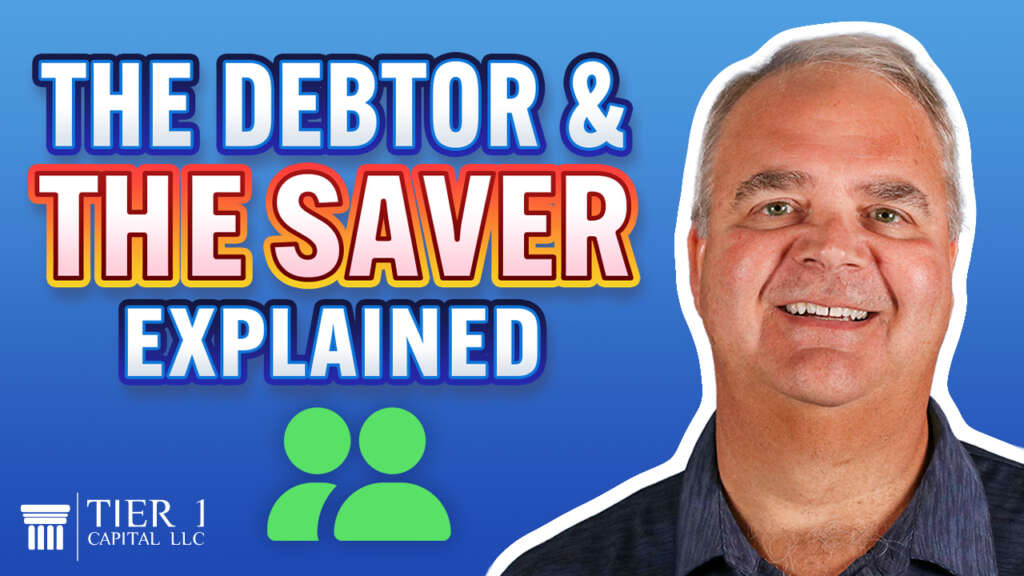
Do you realize we finance every single purchase we make? We either go to a bank or finance company and pay up interest, or we pay cash and we give up interest. But if you’re paying cash, I’m sure your intention isn’t to give up control of your money, or isn’t to lose opportunity cost.
Today, we’re going to talk about how you could still pay cash for things without giving up opportunity costs and without giving up control of your dollar.
You may be familiar with the two main ways of financing any purchase. The debtor, who digs a hole and fills it up and just fights to get their head above the horizon, that zero line. Or the saver, who is kind of the debtor in reverse. They save up money as a matter of course, but once they have enough to make their major capital purchase, they drain the tank and they give up the opportunity cost of the money that could have been earned on their assets.
In both situations, the debtor and the saver spend a lot of their time at the zero line. They don’t get to experience any of the benefits of compound interest. You see, when you’re in debt, your cash flow is obligated to filling in that hole, to getting back up to that zero line. But when you pay cash, you’re still married to that zero line, you’re still saving as a matter of course, but you’re not really getting ahead because once that purchases made, you’ve traded your cash, that you owned and controlled, for the asset for the purchase, whether it’s a vacation, whether it’s a home remodel, it doesn’t matter. All of that cash is gone because you made a purchase.
But that can’t be what the wealthy are doing, right?
What wealthy people do is really simple. They create, cultivate, and keep their money. They keep in control of their wealth as long as possible. Now we have this question, if I want to make a purchase, we don’t want to finance and we don’t want to pay cash, how can I make the purchase?
The answer is simple, leverage. Leveraging other people’s money without draining your savings. Making your money more efficient by accessing other people’s money. We use this by leveraging the infinite banking concept with a specially designed whole life insurance policy designed for cash accumulation.
With this product, we’re able to leverage against our cash value that has accumulated within the policy, without giving up the compound interest. In essence, we’re able to take back the finance function within our own lives.
The key thing here is that we still get to make the purchase. We can make purchases for our own life, whether it’s sending our kids to college or paying for their tuition or paying for a wedding or a down payment on the house. The options are literally limitless.
What this extra step adds is a way to finance these purchases using your own money, without giving up control of the money, without being penalized by taxes, and without being dependent on banks and credit companies.
Not to mention without having to drain down the tank and giving up opportunity costs on our money or without having to give up control of the process. We give our clients a choice. You can either be controlled by the process or be in control of the process. Which would you rather?
I would argue that most financial frustrations come from not having access to money when we really need something. When you have access to cash, it seems like opportunities naturally find you. So whether it’s a business endeavor or an investment opportunity, the options are limitless as to why you should use this cash for. And when you’re able to take advantage of an external opportunity, you’re able to earn an external rate of return on your money, as well as the internal rate of return on your money.
That’s the continuous, uninterrupted compounding of interest.
So how does this play out? Well, you start a policy, you build up a pool of cash that you’re able to access and repay because you own and control that policy. And it’s a matter of course, you’re a saver. You’re always saving money. You’re always being an honest banker and paying yourself back. Then you’re able to leverage that money for retirement on a taxpayer basis and the leftovers get passed on to your family on a tax favored basis.
The tax benefits of life insurance are numerous.
Number one, the cash value grows on a tax deferred basis.
Number two, you’re able to access the cash value on a tax free basis through the loan provision.
Number three, when you die, the life insurance death benefits pass outside of federal income taxes to your name beneficiary. And also, in most states, the death benefit is outside of state income tax and usually state inheritance tax.
So let’s summarize. Number one, you get to make the purchase. Number two, your money earns uninterrupted compounding of interest. Number three, you’re in control of the process. Number four, numerous tax benefits.
If you’d like to see exactly how we put this process to work for our clients, check out our free webinar, The Four Steps to Financial Freedom.
And remember, it’s not how much money you make. It’s how much money you keep that really matters.
